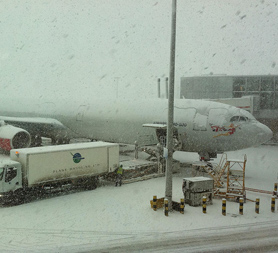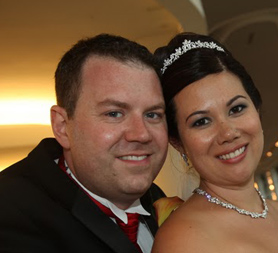Hell at Heathrow: one couple’s cancelled Christmas
For four days, Paul and Sarah Lomax kept Channel 4 News up to date with their nightmare attempt to spend Christmas in New York. Here is their story of the extraordinary situation at Heathrow.

For the majority of passengers stranded at Heathrow this week, this wasn’t about missing out on some winter sun.
Many travellers – my wife and I included – were travelling home to spend Christmas with their families. Instead, we all faced an appalling state of affairs at Europe’s busiest airport.
The Plan
On Saturday 18th we boarded our Air Canada flight to New York via Toronto, scheduled to take off at 12 noon. Everything seemed to be on schedule, although the snow had just started to fall heavily. Our plan was to spend a week in New York City.
Restaurants were booked, visits to friends arranged and tickets purchased to the famous Radio City Music Hall Christmas Spectacular.
Restaurants were booked, visits to friends arranged and tickets purchased to the famous Radio City Music Hall Christmas Spectacular.
We were then to fly to Halifax airport in Nova Scotia, Canada on the 23rd, descending upon Sarah’s parents’ in the town of Shelburne along with her four siblings and their partners, before flying back to London for New Year’s Eve.
Day 1: Saturday 18th
At noon, just as we were due to take off, the pilot announced that the airport was closing temporarily for 45 minutes while they caught up on ploughing.
However, Heathrow Airport’s Twitter feed was reporting a much longer closure, until 4pm – despite the pilots being repeatedly told ‘just another 90 minutes’.
The tower seemed to be keeping the pilots in the dark. Passengers shouldn’t have to feed status updates to the crew.
Passengers shouldn’t have to feed status updates to the crew.
I later discovered that if you know you are delayed more than 90 minutes, then passengers have the right to disembark the plane and wait at the gate.
I believe we were purposefully kept on the plane because the gate was full of passengers waiting for the next flight.
In all, we spent just under seven hours on the plane, on the tarmac at the gate, before the flight was declared cancelled.
Oddly, our plane had been de-iced – a process that takes nearly an hour – despite the airport remaining closed with a queue of 38 full planes waiting to take off.
We had to wait an hour to ‘deplane’ as the arrivals area was full. We were told to come back to the airport the next day where the same plane and crew would, weather permitting, fly us out.
Back in the terminal, having gone through passport control, the baggage area was chaotic. After hunting for the right carousel, as the boards were blank, we were told that it was not safe for the ground crew to remove our luggage. It would remain on the plane overnight.
Every hotel within a six mile radius was fully booked.
We were lucky to have the option of going back to our flat in London that night, as every hotel within a six mile radius was fully booked. We had to battle through crowds (staff said 2,000) to get the train, as the Underground was suspended. Others were not so lucky, and spent the night at the airport.
Day 2: Sunday 19th
On Sunday we headed to Heathrow but were halted at Paddington, where Heathrow Express staff told us the airport was closed and trains cancelled.
We camped in the lounge of the Hilton and tried to get through to both Air Canada and our agent, Opodo.
We had no luck with the airline, but after an hour on hold to Opodo, we were told that they had no information from the airline and couldn’t rebook until Monday.
The earliest they could re-book us to New York was on Christmas Day – two days after our scheduled flight from NYC to Halifax.
By noon we were getting concerned about our bags, and Sarah managed to find a number for the airline’s baggage team at Heathrow. They informed us our cases had been removed from the plane overnight, and we should come to the airport to collect them as they had just re-opened the doors.
We caught the first available train. Upon arrival we decided to try and speak to an Air Canada rep first. We queued for two hours at the reservations desk, where staff who normally run the check-in desks were helping.
The earliest they could re-book us to New York was on Christmas Day – two days after our scheduled flight from NYC to Halifax. The first to Nova Scotia direct would have been on Boxing Day. Nothing was leaving on Sunday.
Despite one open runway, the airport reported problems with ice on the stands. But, they said, if we came back the following morning we could try for a standby flight. With three Air Canada planes stuck in Paris on diversion from Saturday, if they could retrieve them, they would run extra flights.
We collected our luggage from dozens of piles in the customs area, after being taken through the staff security door. We paid to leave our cases in left luggage overnight and headed home again.

Day 3 – Monday 20th
We knew getting on the standby list would be first-come first-served. We arrived at the airport around 6am. By this point we’d spent £180 travelling to the airport.
Terminal 3 was like nothing we’ve ever seen – debris everywhere, people huddling together on the floor with foil blankets, and thousands starting to form queues, which were more like crowds.
There were no airline or airport staff to organise anything: no signage, no barriers, no communication
There were no airline or airport staff to organise anything: no signage, no barriers, no communication. We had to ask fellow passengers for the right place to queue; and again to find the end of it!
After six hours queuing, we were finally put in 64th position on the standby list, albeit to Montreal instead of Halifax.
The Air Canada rep warned us it was a paper exercise and she was right – an hour or two later, standing within earshot of the standby desk, we learned the planes from Paris hadn’t made it back and the rest of the east-coast flights were now cancelled.
Once we were on standby I went to Arrivals to collect our luggage only to discover the doors to Departures had been locked behind me. Hundreds were kept out in the cold, and only those with proof they were booked on a confirmed flight that was checking in were allowed back in the building.
I went to Arrivals to collect our luggage only to discover the doors to Departures had been locked behind me
Luckily a friendly BAA staff member listened to my pleas and directed me to a hidden unlocked side door into the building, for use by staff.
Day 4 – Tuesday 21st
We knew returning on Tuesday would be fruitless. That was it for us. Game over.
But we were the lucky ones with another option, so booked train tickets to Manchester for Christmas with Paul’s parents. It wasn’t until we got home again and cancelled all our New York bookings and Sarah called her parents that the emotion of our cancelled Christmas really hit us.
We made friends during our shared experiences on the plane and in the queues, and we were genuinely sad to leave them with their fates still undetermined.
Some were so desperate to get home to Canada that they asked to be shortlisted on west coast flights – to put that into perspective, a flight across Canada is further than across the Atlantic. We hope they made their way home to their families safely for Christmas.
It wasn’t until Sarah called her parents that the emotion of our cancelled Christmas really hit us
I hope that this farce is never repeated, for Britain’s international reputation may never recover. Whilst we may not get a fraction of the snow Canada does, arguably making it harder to justify investment in equipment (although Gatwick managed it!), it does not excuse the chaos that followed the snow.
As observers inside the airport, we saw a huge lack of contingency planning, slow decision making and lack of communication.
It took three days for BAA to hand out food, to put up a marquee for those they were locking outside in subzero temperatures, to provide free wifi, or to offer free trains back to London.There was a shortage of barriers, blankets and staff – not to mention ploughs and de-icers.
Their only plan seemed to be the hope that people would give up on their flight and go home
As for the airlines, foolish optimism and poor communication between them and the airport meant that flights remained scheduled when it was clearly unrealistic, resulting in thousands of people turning up to Heathrow unnecessarily.
Their only plan seemed to be the hope that people would give up on their flight and go home. But for so many, home was at the other end of the journey.